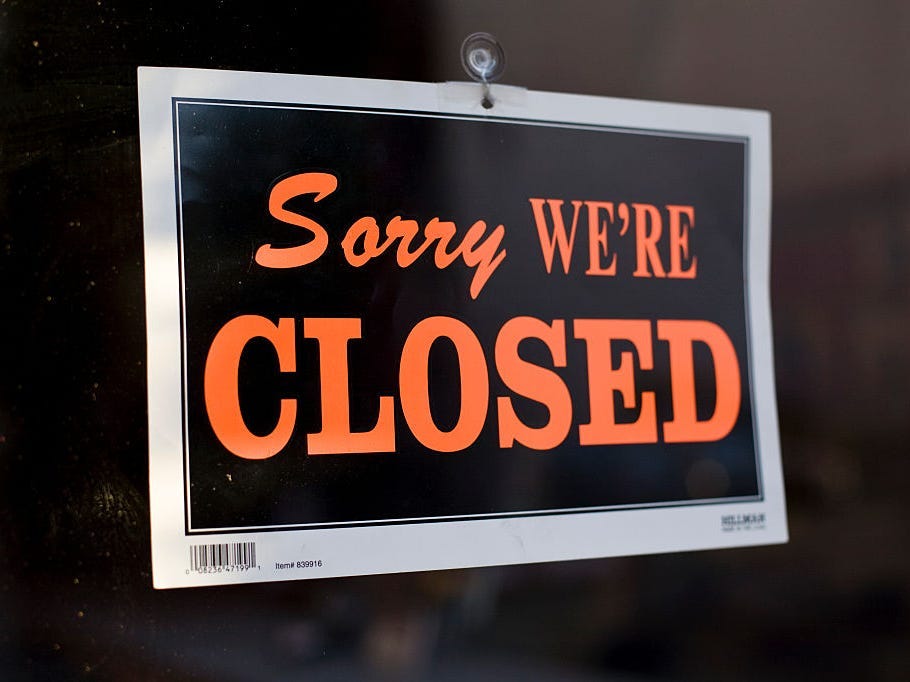
James Leynse/Corbis via Getty Images
- Businesses are cutting back on their services because of the labor shortage.
- Those affected range from a cleaning company in Virginia to a dog-walking business in Georgia.
- Even though the service cuts cost them customers, they don't have enough staff to operate as usual.
- See more stories on Insider's business page.
Laughing Pets, a pet-sitting and dog-walking company in Atlanta, Georgia, turned down a holiday job worth around $2,500 because it couldn't find enough staff.
"We get, on average, four new inquiries per day and we have to turn all of them away," its owner Karen Levy told Insider.
She said that she used to hire 12 members of staff, which has fallen to just five. As well as turning away prospective customers, she'd had to suspend some visits to long-term clients, too.
"I may never get those clients back," Levy said, adding that she was even grateful for cancellations because it meant her remaining staff wouldn't get burned out.
Levy isn't alone. Other businesses small across the US have also resorted to dramatically slashing their opening hours or cutting back on their services – both because they can't find enough staff to operate as usual and because labor is getting more expensive. Nearly a quarter of small and medium-sized businesses said in a poll by Alignable they'd reduced operating hours to cut payroll expenses.
At Maid to Sparkle, a residential cleaning service in Richmond, Virginia, the workforce has fallen by roughly half, according to owner Jonathan Bergstein.
As a result, the company is cleaning between 15 and 20 houses a day, down from 30 pre-pandemic, he said.
He said that he had to turn down business and reschedule loyal customers, who he feared he could lose to a competitor.
"Every morning we have to decide who will be cleaned and who will not be cleaned," Bergstein said.
He said that the labor shortage and the resultant drop in capacity meant that Maid to Sparkle's gross profit had dropped by between $1,000 and $2,000 each week.
Before the pandemic, Maid to Sparkle made around $750,000 a year in gross profit, Bergstein said.
"Now we'll be lucky if we gross maybe $300,000," he said.
Debra Marsteller is the CEO of Project Independence, a medium-sized nonprofit in California that works with adults with developmental disabilities. She said that the organization had lost around 30% of its staff.
"This is why I'm up in the middle of the night," she said.
The labor shortage meant that the organization was having to reduce support to some adults in supported-living facilities, according to Marsteller. Some may move to other agencies as a result, Marsteller said.
"Normally, we try to move our higher-need independent-living individuals into our supported-living program, but this has become less possible due to staff shortage and the inability to attract new staff to meet the increased need for daily support shifts," she said.
And Laborjack, a labor-for-hire company in Colorado, told Insider it expected to turn down jobs worth between $300,000 and $500,000 in 2021 because it can't find enough workers.
Laborjack's owners said in July that it had been able to raise prices, but had had to put up wages and pay out more bonuses to attract more workers.
"Our margin has decreased despite the fact that we're increasing prices, just because we're trying to pay out all these bonuses," co-founder Blake Craig said.
The owners of small businesses are in many cases cutting down how many hours they spend managing their business to instead provide labor themselves.
Bergstein said he was cleaning houses for around five hours a day, while Levy said she spent around 30 hours a week doing dog walks and pet visits, on top of running her business.
"I can't remember having a day off in the past few weeks," she lamented.